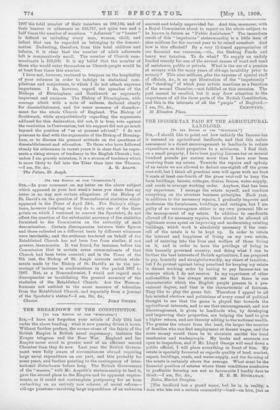THE INCOME-TAX PAID BY THE AGRICULTURAL LANDLORD.
[To THU EDITOR or Tar "SPECTAT011.1 Sin, —I should like to point out how unfairly the Income-tax is assessed on agricultural landlords, and that this unfair assessment is a direct encouragement to landlords to reduce expenditure on their properties to a minimum. I find that, on a small property, I have been paying Income-tax on several hundred pounds per annum more than I have ever been receiving from my estate. Towards the repairs and upkeep of an estate we are allowed to deduct one-eighth off the gross rent-roll, but I think all practical men will agree with me that it costs at least one-fourth of the gross rent-roll to keep the farm buildings, houses, cottages, drains, fences, water-supply, and roads in average working order. Anyhow, that has been my experience. I manage the estate myself, and conduct everything on the strictest business principles. Each year, in addition to the necessary repairs, I gradually improve and modernise the farmhouses, buildings, and cottages, but I am guilty of no extravagance either in my own personal life or the management of my estate. In addition to one-fourth allowed off for necessary repairs, there should be allowed n11 legitimate sums spent on improving and modernising existing buildings, which work is absolutely necessary if the rent- roll of the estate is to be kept up. In order to retain the interest and happiness of living on my own estate, and of entering into the lives and welfare of those living on it, and in order to have the privilege of living in this honestly governed country, and doing what I can to further the best interests of British agriculture, I am prepared to pay, honestly and straightforwardly, my share of taxation; but I do protest against being penalised for keeping my estate in decent working order by having to pay Income-tax on moneys which I do not receive. In my experience of other nationalities it has always struck me that there is one characteristic which the English people possess in a pre- eminent degree, and that is the characteristic of fairness. They like to play the game fair. Therefore I appeal to all fair-minded electors and politicians of every creed of political thought to see that the game is played: fair towards the agricultural interests, and to see that encouragement, and not discouragement, is given to landlords who, by developing and improving their properties, are helping the land to give a higher return, and are thereby adding to thenational wealth. The greater the return from the land, the larger the number of families who can find employment at decent wages, and the more money would there be to circulate amidst the local mechanics and tradespeople. My books and accounts are open to inspection, and if Mr. Lloyd George will send down a public official, I will place everything in front of him. My estate is specially favoured as regards quality of land, market, aspect, buildings, roads, and water-supply, and the farming of the estate is certainly above the average. What must be the financial position of estates where these conditions conducive to profitable farming are not so favourable I hardly dare to [The landlord has a grand name, but he is, in reality,' a man who lets out a certain commodity—land—on hire, just as other men let out cabs or motor-cars. These have to be kept in repair, and. if those who let them, out are well enough off to pay Income-tax, they deduct the sums spent on repairs before they arrive at the profits of their business which must be returned for Incense-tax. Why should landlords not deduct what they spend on repairs P Without such repairs they cannot let their farms any more than a man can let out an unrepaired motor-car. We suppose the gross uofairness to
• the owners of land has arisen from the plan of collecting the tax at the source;. but that is no excuse for continuing to perpetrate a gross injustice. In Pitt's day repairs were not the terrible item they now are.—En. Spectator.)











































 Previous page
Previous page